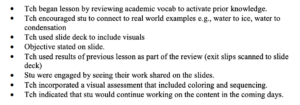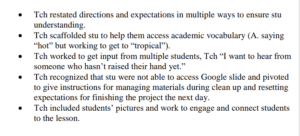1.A.1 Subject Matter Knowledge: Demonstrates sound knowledge and understanding of the subject matter and the pedagogy it requires by consistently engaging students in learning experiences that enable them to acquire complex knowledge and subject-specific skills and vocabulary, such that they are able to make and assess evidence-based claims and arguments.
Explanation: Throughout the year, I have been careful to thoroughly review the content standards and utilize them as a guide for my instructional planning. Further documentation of my thought process in structuring lessons anchored in curriculum framework standards is illustrated in the rationale and content standards sections of my learning portraits one and two.
Evidence:

1A.4: Well-Structured Lessons: Adapts as needed and implements standards-based units comprised of well-structured lessons with challenging tasks and measurable outcomes; appropriate student engagement strategies, pacing, sequence, resources, and grouping; purposeful questioning; and strategic use of technology and digital media; such that students are able to learn the knowledge and skills defined in state standards/local curricula.
Explanation:
Evidence:

1B.2: Adjustment to Practice: Analyzes results from a variety of assessments to determine progress toward intended outcomes and uses these findings to adjust practice and identify and/or implement differentiated interventions and enhancements for students.
Explanation: In planning my lessons, I worked to adjust my practice based on data from my assessments. This can be seen in both of my units (one and two). Differentiation based on student needs can be seen through my implementation of Universal Design in my lessons 4-5 of my climate unit.
Evidence:
